
3-4 Oct 2024




3-4 Oct 2024


Kindly supported by Donald and Louise MacDonald
Thursday 3 October, 7.30pm, The Usher Hall, Edinburgh
Friday 4 October, 7.30pm, City Halls, Glasgow
MOZART Symphony No 38 in D ‘Prague’
Interval of 20 minutes
MOZART Mass in C minor
Maxim Emelyanychev Conductor
Lucy Crowe Soprano
Anna Dennis Soprano
Thomas Walker Tenor
Edward Grint Bass Baritone
SCO Chorus
Gregory Batsleer Chorus Director

4 Royal Terrace, Edinburgh EH7 5AB
+44 (0)131 557 6800 | info@sco.org.uk | sco.org.uk
The Scottish Chamber Orchestra is a charity registered in Scotland No. SC015039. Company registration No. SC075079.
THANK YOU
Our Principal Conductor’s Circle are a special part of our musical family. Their commitment and generosity benefit us all – musicians, audiences and creative learning participants alike.
Annual Fund
James and Patricia Cook
Visiting Artists Fund
Colin and Sue Buchan
Harry and Carol Nimmo
Anne and Matthew Richards
International Touring Fund
Gavin and Kate Gemmell
Creative Learning Fund
Sabine and Brian Thomson
Conductor Emeritus Joseph Swensen
Donald and Louise MacDonald
Chorus Director Gregory Batsleer
Anne McFarlane
Principal Second Violin
Marcus Barcham Stevens
Jo and Alison Elliot
Second Violin Rachel Smith
J Douglas Home
Principal Viola Max Mandel
Ken Barker and Martha Vail Barker
Viola Brian Schiele
Christine Lessels
Viola Steve King
Sir Ewan and Lady Brown
Principal Cello Philip Higham
The Thomas Family
Sub-Principal Cello Su-a Lee
Ronald and Stella Bowie
American Development Fund
Erik Lars Hansen and Vanessa C L Chang
Productions Fund
Anne, Tom and Natalie Usher
Bill and Celia Carman
Anny and Bobby White
Scottish Touring Fund
Eriadne and George Mackintosh
Claire and Anthony Tait
Cello Donald Gillan
Professor Sue Lightman
Cello Eric de Wit
Jasmine Macquaker Charitable Fund
Principal Double Bass Nikita Naumov
Caroline Hahn and Richard Neville-Towle
Principal Flute André Cebrián
Claire and Mark Urquhart
Principal Oboe Robin Williams
In memory of Hedley G Wright
Principal Clarinet Maximiliano Martín
Stuart and Alison Paul
Principal Bassoon Cerys Ambrose-Evans
Claire and Anthony Tait
Principal Timpani Louise Lewis Goodwin
Geoff and Mary Ball


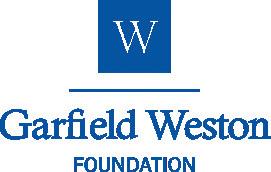
Diamond
Malcolm and Avril Gourlay
John and Jane Griffiths
James and Felicity Ivory
Robin and Catherine Parbrook
Tom and Natalie Usher
Platinum
Silvia and Andew Brown
David Caldwell in memory of Ann
Dr Peter Williamson and Ms Margaret Duffy
Judith and David Halkerston
Audrey Hopkins
David and Elizabeth Hudson
Helen B Jackson
Dr and Mrs Peter Jackson
Dr Daniel Lamont
Chris and Gill Masters
Duncan and Una McGhie
Anne-Marie McQueen
James F Muirhead
Patrick and Susan Prenter
Mr and Mrs J Reid
George Ritchie
Martin and Mairi Ritchie
Hilary E Ross
Elaine Ross
George Rubienski
Jill and Brian Sandford
Michael and Elizabeth Sudlow
Robert and Elizabeth Turcan
Alan and Sue Warner
Finlay and Lynn Williamson
Ruth Woodburn
William Zachs
Peter Armit
Adam Gaines and Joanna Baker
John and Maggie Bolton
Elizabeth Brittin
James Wastle and Glenn Craig
Jo and Christine Danbolt
James and Caroline Denison-Pender
Andrew and Kirsty Desson
David and Sheila Ferrier
Chris and Claire Fletcher
Dr J W E Forrester
James Friend
Iain Gow
Margaret Green
Christopher and Kathleen Haddow
Catherine Johnstone
Gordon Kirk
Janey and Barrie Lambie
Mike and Karen Mair
Roy and Svend McEwan-Brown
John and Liz Murphy
Maggie Peatfield
Charles Platt
Alison and Stephen Rawles
Andrew Robinson
Olivia Robinson
Anne McAlister and Philip Sawyer
Irene Smith
Ian S Swanson
Ian and Janet Szymanski
John-Paul and Joanna Temperley
Bill Welsh
Robert Mackay and Philp Whitley
Catherine Wilson
Neil and Philippa Woodcock
G M Wright
Silver
Roy Alexander
Fiona and Neil Ballantyne
The Batsleer Family
Jack Bogle
Jane Borland
Michael and Jane Boyle
Mary Brady
John Brownlie
Laura Buist
Robert Burns
Kate Calder
Sheila Colvin
Lorn and Camilla Cowie
Lord and Lady Cullen of Whitekirk
Adam and Lesley Cumming
Dr Wilma Dickson
Sylvia Dow
Raymond Ellis
Dr and Mrs Alan Falconer
Sheila Ferguson
Malcolm Fleming
Dr William Irvine Fortescue
Dr David Grant
Andrew Hadden
J Martin Haldane
Ronnie and Ann Hanna
Roderick Hart
Norman Hazelton
Ron and Evelynne Hill
Philip Holman
Clephane Hume
Tim and Anna Ingold
David and Pamela Jenkins
Margaret Mortimer and Ken Jobling
Julie and Julian Keanie
Professor Christopher and Mrs Alison Kelnar
Dr and Mrs Ian Laing
Graham and Elma Leisk
Geoff Lewis
Christopher and Molly Ludlam
Dorothy A Lunt
Vincent Macaulay
James McClure in memory of Robert Duncan
Gavin McCrone
Brian Miller
Alistair Montgomerie
Andrew Murchison
Pamela Andrews and Alan Norton
David and Tanya Parker
John Peutherer in memory of Audrey Peutherer
James S Potter
Timothy Barnes and Janet Sidaway
Catherine Steel
Takashi and Mikako Taji
Douglas and Sandra Tweddle
C S Weir
Susannah Johnston and Jamie Weir
We are indebted to everyone acknowledged here who gives philanthropic gifts to the SCO of £300 or greater each year, as well as those who prefer to remain anonymous.
We are also incredibly thankful to the many individuals not listed who are kind enough to support the Orchestra financially on a regular or ad hoc basis. Every single donation makes a difference.
Become a regular donor, from as little as £5 a month, by contacting Hannah Wilkinson on 0131 478 8364 or hannah.wilkinson@sco.org.uk.
“A crack musical team at the top of its game.”

HM The King
Patron
Donald MacDonald CBE
Life President
Joanna Baker CBE
Chair
Gavin Reid LVO
Chief Executive
Maxim Emelyanychev
Principal Conductor
Andrew Manze
Principal Guest Conductor
Joseph Swensen
Conductor Emeritus
Gregory Batsleer
Chorus Director
Jay Capperauld
Associate Composer
Our Musicians
Information correct at the time of going to print
First Violin
Eva Aronian
Afonso Fesch
Tom Hankey
Aisling O’Dea
Fiona Alexander
Amira Bedrush-McDonald
Sarah Bevan Baker
Second Violin
Marcus Barcham Stevens
Michelle Dierx
Rachel Smith
Will McGahon
Niamh Lyons
Kirsty Main
Abigail Young
Viola
Hélène Clement
Jessica Beeston
Steve King
Rebecca Wexler
Cello
Philip Higham
Su-a Lee
Donald Gillan
Eric de Wit
Bass
Nikita Naumov
Jamie Kenny
Adrian Bornet
Flute
André Cebrián
Marta Gómez
Oboe
Robin Williams
Katherine Bryer
Bassoon
Cerys Ambrose-Evans
Alison Green
Horn
Ken Henderson
Jamie Shield
Trumpet
Peter Franks
Shaun Harrold
Trombone
Duncan Wilson
Cillian Ó’Ceallacháin
Alan Adams
Timpani
Louise Lewis Goodwin
Organ
Andrew Forbes

Cerys Ambrose-Evans
Principal Bassoon
MOZART (1756-1791)
Symphony No 38 in D ‘Prague’, K 504 (1786)
Adagio – Allegro Andante Finale
Mass in C minor, K 427 (1782–83)
Kyrie Gloria Credo Sanctus Benedictus
Mozart’s music can be intimate and softly spoken, of course, like a conversation between friends, or even a profound contemplation of inner anxiety. But it can also blaze with energy, splendour and light – as the two pieces in tonight’s Mozart Gala demonstrate beyond any doubt.
We probably shouldn’t be surprised: Mozart had specific intentions for each of them, whether to convey his deep affection for a city that loved him more than any other, or to offer gratitude to the Almighty for his longed-for marriage and to reaffirm his religious beliefs. Those wishes, however, drew from him some of the most lavish, ambitious and downright spectacular music he created – even if it’s never lacking in the subtlety and wit of his quieter creations.
There’s plenty of evidence that Mozart was able to compose with remarkable ease, fluency and speed – in fact, that’s probably the main thing many people associate with him. His Prague Symphony, however, is one of the few pieces for which sketches survive showing the composer working through themes, or tweaking them so that they’d combine together or could be transformed across a movement. He clearly invested a lot of energy and creativity in the work. And when you look at the circumstances of its premiere, you can understand why.
His opera The Marriage of Figaro opened at Vienna’s Burgtheater on 1 May 1786 to critical acclaim, but a rather lukewarm reaction from the general public. Just a few years earlier, the Imperial capital had adored Mozart and his music, but the opera’s premiere marked the start of Vienna’s notoriously fickle audiences falling a bit out of love with him. At its staging in Prague in December that year, however, Figaro was an

immediate and triumphant success, and the city’s musical bigwigs begged the composer to visit in person, to experience the acclaim and to direct some of his own music. He duly obliged in January 1787, and by all accounts, Mozart’s trip was a non-stop round of banquets, parties and balls.
Prague loved Mozart, and the feelings were reciprocated. In honour of the occasion, Mozart unveiled one of his richest, most complex works in a concert on 19 January 1787. The Prague Symphony contains some of the grandest, most sophisticated music written up to that time, and it went down a storm with its first audience’. So successful was Mozart’s visit, in fact, that off its back he received another Prague commission: for an opera on the exploits of Don Juan, which became a certain Don Giovanni
It’s ironic, then, that Mozart’s 'Prague' Symphony was almost certainly not written
He clearly invested a lot of energy and creativity in the work. And when you look at the circumstances of its premiere, you can understand why.
specifically for his overwhelmingly successful trip. In fact, it looks like he’d completed the work before he’d even been invited to the city. Mozart’s letters show that he was planning a trip to England at the time he was composing his Symphony No 38, a visit that never happened when his father Leopold refused to look after the composer’s two children. Had Leopold been happy to babysit, what we now know as the 'Prague' Symphony might well have been dubbed the 'London' Symphony instead.
But whatever its intended destination, there’s no mistaking the Symphony’s grandeur –even in the far-reaching harmonies through which Mozart pushes the expectant slow introduction to his first movement. When the movement’s faster music finally arrives, it’s with an urgent, almost heartbeat-like figure in the violins, before a surprisingly slithering, chromatic theme that begins in the lower strings, later jumping to the oboe.
There’s more of that chromatic slithering in the main theme of Mozart’s dance-like second movement, whose good-natured, somewhat homespun rusticity undercuts the courtly elegance of its form. Mozart’s finale is a dazzling, quicksilver movement that blazes into energetic life as the full orchestra enters noisily after a somewhat hushed opening. Its second main theme might be calmer and more elegant, but it can’t stop the goodnatured high jinks for long.
From Prague, we jump back to Vienna for tonight’s next piece – and, in fact, we even make a brief return to Mozart’s birthplace of Salzburg. In the late 1770s, Vienna was the city in which Mozart longed to live and work. He’d finally made a break from what he felt was the suffocating provinciality of the Salzburg court in June 1781 – when he was quite literally booted out of his position (with a ceremonial ‘kick in the backside’) as court musician by the steward of Salzburg’s ruler, Prince-Archbishop Hieronymus Colloredo.
After several years of trying to escape Salzburg, Mozart was finally a free man in Vienna, but he was also faced with the challenge of establishing himself as a self-employed performer and composer. Furthermore, he was deeply in love with the soprano Constanze Weber (and had been besotted with her elder sister Aloysia five years earlier). His domineering father Leopold didn’t approve, however, worrying that these infatuations would distract his son from his all-important musical destiny (and the money and fame it would hopefully bring him).
Mozart’s relationship with Constanze proved far more than an infatuation, however. Although their courtship was hardly smooth (they even split up briefly after Mozart grew
outraged that she had let another man touch her legs during a parlour game), they were finally married on 4 August 1782 in St Stephen’s Cathedral, Vienna – with the reluctant blessing of Mozart’s father.
Mozart’s monumental Mass in C minor is inextricably linked with these events. He promised his father that he’d mark the life-changing moment of his marriage by composing a lavish but serious-minded Mass, as both an expression of gratitude for his marital union, and also a reaffirmation of his spiritual beliefs. (He went further, admitting to his father than it was Constanze herself who’d encouraged him to take his faith more seriously, and to actually go to church once in a while.)
Constanze, however, also played a crucial role in the music of the Mass in C minor: Mozart wrote it – and its particularly elaborate, exuberant part for solo soprano – as something of a showcase for her vocal talents. In many ways, it’s a love letter to both God and his new wife.
The Mass received its first performance on 26 October 1783, though in Salzburg (in the ancient St Peter’s Abbey Church) rather than Vienna: Mozart and his new wife were making a trip back to the city, primarily so that Constanze and Leopold could finally meet in person.
It’s unclear, however, what was actually performed on that occasion. As it currently stands, Mozart’s Mass in C minor is incomplete – at least in terms of the sections we’d traditionally associate with a conventional religious Mass. Only its Kyrie and Gloria sections are fully finished. There are missing elements in the Credo section, and the entire Agnus Dei section is absent

(perhaps, it’s been speculated, because it wasn’t usually included in Salzburg services).
There are several possible explanations for that incompleteness. The Mass was a labour of love for Mozart, rather than a paid-for commission: it’s possible, therefore, that he simply diverted his attention to more lucrative and pressing commitments, and never quite got round to finishing it. Another possibility is, too, that that first performance may have filled the piece’s holes with sections from Mozart’s earlier Mass settings – with the inevitable clashes of style that that would involve. Indeed, it’s only in recent years that the Mass in C minor has become widely known, following a completion by German musicologist Alois Schmitt, and a later overhaul of the whole work by eminent US scholar HC Robbins Landon.
Despite its incompleteness, however, the Mass in C minor is undeniably a
Despite
its incompleteness, however, the Mass in C minor is undeniably a monumental work, second only in size and ambition to Mozart’s
Requiem (another work he left incomplete, though this time for more pressing reasons of illness and death)
monumental work, second only in size and ambition to Mozart’s Requiem (another work he left unfinished, though this time for more pressing reasons of illness and death). It’s comparable, in fact, to the scale of a piece such as Bach’s mammoth B minor Mass. Furthermore, Mozart consciously doffed his cap to the earlier master in the piece’s music. Encouraged by his Viennese friend and supporter Baron Gottfried von Swieten, he’d been immersing himself in the music of Bach and Handel, and knew that his wife adored their creations too. Mozart clearly took profound inspiration from the music of earlier decades, but it wasn’t a fascination shared by many. Novelty was highly prized by Viennese listeners, who were always on the lookout for the latest trend that might provoke or titillate their tastes. That’s perhaps another reason why Mozart chose Salzburg, rather than Vienna, to unveil this serious, complex, sometimes dark piece.
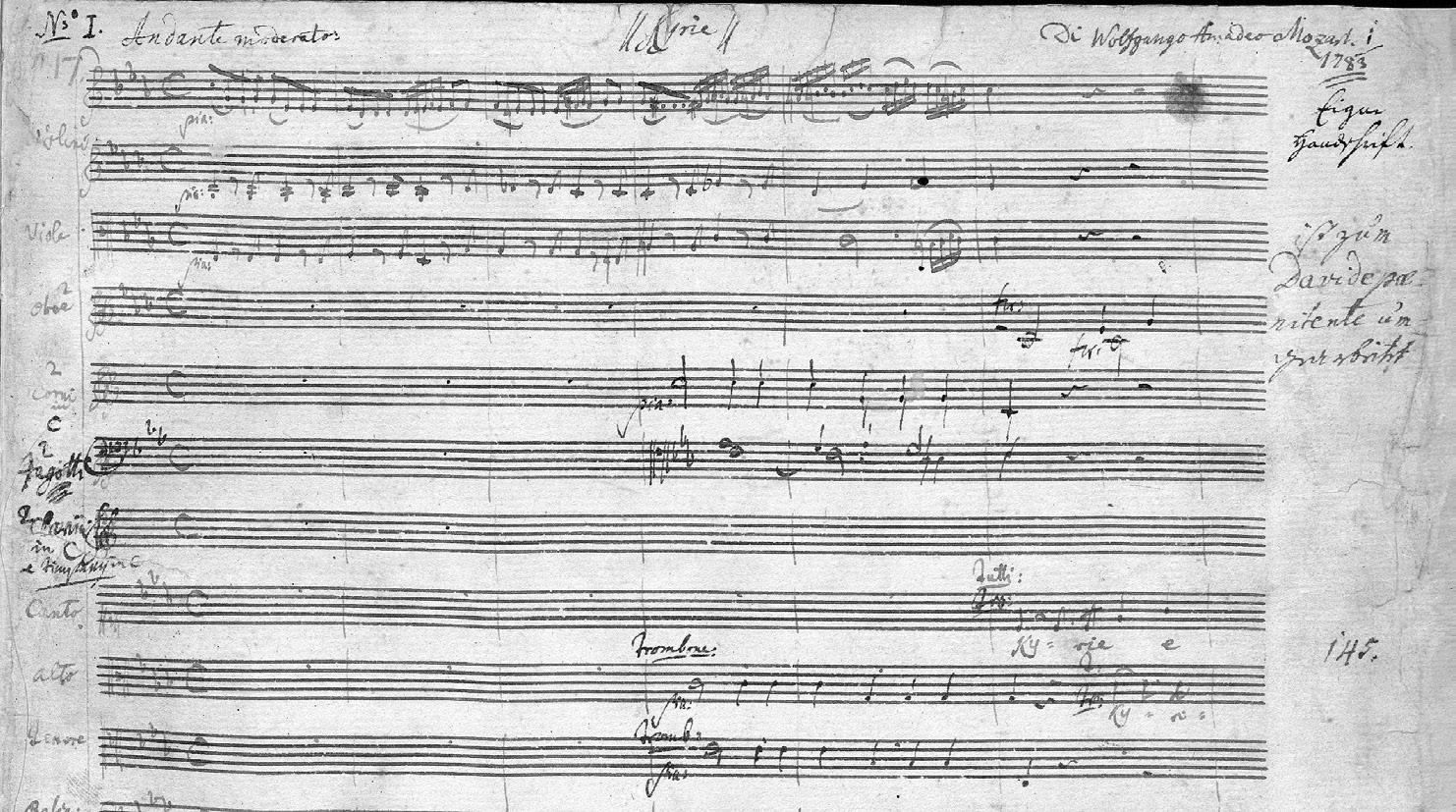
In the opening Kyrie section, Mozart contrasts a sombre, solemn opening ‘Kyrie eleison’ for choir with a soaring soprano solo in the tender ‘Christie eleison’. His Gloria falls into seven separate parts. After the spirited rejoicing of its opening ‘Gloria in excelsis Deo’, with clear echoes of Handel, the soprano again steps forward for the Italian-style ‘Laudamus te’, while the awe-filled chorus of ‘Gratias agimus tibi’ suggests the majesty and might of God. ‘Domine Deus’ is a joyful duet for two sopranos, while the ‘Qui tollis’ is possibly the Mass’s mightiest movement, a dramatic double chorus whose spiky rhythms look back to Bach and Handel. A tenor soloist joins the two sopranos for the florid ‘Quoniam’, and after the brief ‘Jesu Christe’, the imposing fugue of ‘Cum Sancto Spiritu’ brings the Gloria section to a dramatic climax.
The Credo section opens with an upbeat expression of belief in the choral ‘Credo in unum Deum’, which is followed by one of
the Mass’s most remarkable moments. ‘Et incarnatus est’ is a lilting song for soprano plus flute, oboe and bassoon that has provoked certain commentators to wonder what it’s doing in a supposedly pious work of faith. Nonetheless, it demonstrates Mozart’s breadth of musical reference in the Mass, and even includes an intricate, airborne cadenza that interweaves all four soloists.
The Mass as it stands ends with its Sanctus section. The opening movement contrasts an imposing opening ‘Sanctus’ with a quieter ‘Domine Deus’, then a more assertive ‘Pleni sunt caeli’ and a mighty eight-part fugue on ‘Hosanna in excelsis’. The contrasting ‘Benedictus’ movement is a quartet for the two solo sopranos, tenor and bass – the only time in the Mass that all four vocal soloists sing together. A condensed version of the earlier ‘Hosanna in excelsis’ brings the Mass to a resounding close.
© David Kettle
Featuring music by Poulenc, Stravinsky, Vivaldi and Rameau

For tickets and more info visit sco.org.uk
9-11 Oct, 7.30pm
Ayr | Edinburgh | Glasgow
MOZART (1756-1791)
Mass in C minor, K427 (1782-83)
Kyrie eleison. Christe eleison. Kyrie eleison.
Gloria in excelsis Deo, et in terra pax hominibus bonae voluntatis.
Laudamus te, benedicimus te, adoramus te, glorificamus te. Gratias agimus tibi propter magnam gloriam tuam.
Domine Deus, Rex caelestis, Deus Pater omnipotens, Domine Fili unigenite, Jesu Christe, Domine Deus, Agnus Dei, Filius Patris.
Qui tollis peccata mundi miserere nobis, suscipe deprecationem nostram. Qui sedes ad dexteram Patris, miserere nobis.
Quoniam tu solus Sanctus, quoniam tu solus Dominus, tu solus Altissimus, Jesu Christe. Cum Sancto Spiritu in gloria Dei Patris, Amen.
Lord have mercy upon us. Christ have mercy upon us. Lord have mercy upon us.
Glory be to God on high, and on earth peace, goodwill towards men.
We praise Thee, we bless Thee, we worship Thee, we glorify Thee.
We give thanks to Thee for Thy great glory.
O Lord God, heavenly King, God the Father Almighty, O Lord, the only begotten Son, Jesus Christ, Lord God, Lamb of God, Son of the Father.
Thou that takest away the sins of the world, have mercy on us, receive our prayer. Thou that sittest at the right hand of the Father, have mercy on us.
For Thou only art holy, Thou only art the Lord, Thou only art most high, Jesus Christ. With the Holy Ghost, in the Glory of God the Father, Amen.
Credo in unum Deum, Patrem omnipotentem, factorem coeli et terrae, visibilium omnium et invisibilium. Et in unum Dominum, Jesum Christum, Filium Dei unigenitum, et ex Patre natum ante omnia saecula.
Deum de Deo, lumen de lumine, Deum verum de Deo vero, genitum non factum, con substantialem Patri, per quem omnia facta sunt, qui propter nos homines et propter nostram salutem descendit de coelis.
Et incarnatus est de Spiritu Sancto ex Maria Virgine et homo factus est.
I believe in one God, the Father Almighty, Maker of heaven and earth, and of all things visible and invisible. And in one Lord Jesus Christ, the only begotten Son of God, begotten of the Father before all worlds.
God of God, light of light, very God of very God, begotten not made, being of one substance with the Father, by whom all things were made. Who for us men, and for our salvation, came down from heaven. And was made incarnate by the Holy Ghost of the Virgin Mary, and was made Man.
Sanctus, Sanctus, Sanctus, Dominus Deus Sabaoth. Pleni sunt coeli et terra gloria tua. Osanna in excelsis.
Holy, Holy, Holy, Lord God of Hosts. Heaven and earth are full of Thy glory. Hosanna in the highest.
BENEDICTUS
Benedictus qui venit in nomine Domini. Osanna in excelsis.
Blessed is He that cometh in the name of the Lord. Hosanna in the highest.

At the Scottish Chamber Orchestra Maxim Emelyanychev follows in the footsteps of just five previous Principal Conductors in the Orchestra’s 49-year history; Roderick Brydon (1974-1983), Jukka-Pekka Saraste (1987-1991), Ivor Bolton (1994-1996), Joseph Swensen (1996-2005) and Robin Ticciati (2009-2018).
Recent highlights have included a US tour and a performance at the London Proms with the Scottish Chamber Orchestra and his debuts with the Berliner Philharmoniker, New Japan Philharmonic, Osaka Kansai Philharmonic, Bergen Philharmonic, Finnish Radio Symphony Orchestra, Orchestre de Chambre de Paris.
In 2023/24 Maxim’s highlights included the following debuts: Symphonieorchester des Bayerischen Rundfunks, WDR Sinfonieorchester Köln, SWR Symphonieorchester Stuttgart, Deutsche Kammerphilharmonie Bremen, Toronto Symphony Orchestra, City of Birmingham Symphony Orchestra, Orchestre Philharmonique de Radio-France, Mozarteum Orchestra at the Salzburg Festival. He returns to the Deutsches Symphonie-Orchester Berlin, Royal Concertgebouw Orchestra, Rotterdam Philharmonic, Mahler Chamber Orchestra, Netherlands Philharmonic Orchestra, Orchestra of the Age of Enlightenment and the Swedish Radio Symphony Orchestra.
He regularly collaborates with renowned artists such as Max Emanuel Cenčić, Patrizia Ciofi, Joyce DiDonato, Franco Fagioli, Richard Goode, Sophie Karthäuser, Stephen Hough, Katia and Marielle Labèque, Marie-Nicole Lemieux, Julia Lezhneva, Alexei Lubimov, Riccardo Minasi, Xavier Sabata and Dmitry Sinkovsky.
Maxim is also a highly respected chamber musician. His most recent recording (on Aparté), of Brahms Violin Sonatas with long-time collaborator and friend Aylen Pritchen has attracted outstanding reviews internationally. With the Scottish Chamber Orchestra, Maxim has made critically-acclaimed recordings of Schubert Symphony No 9 – the symphony with which he made his debut with the orchestra – and Mendelssohn Symphonies Nos 3 'Scottish' and 5 'Reformation' both on Linn Records. Their latest recording, of Schubert Symphonies Nos 5 and 8, will be released in November.
For full biography please visit sco.org.uk
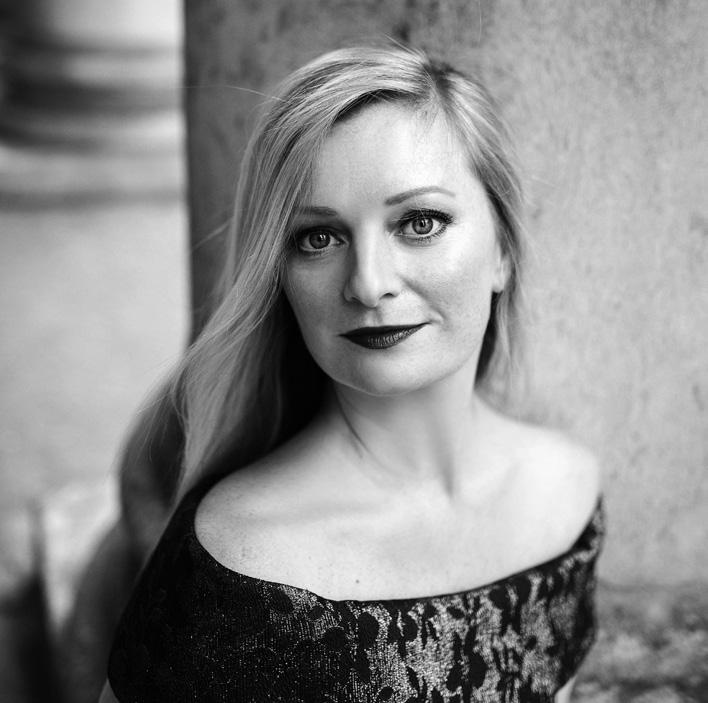
Widley regarded as one of the most versatile and respected singers of her generation, Lucy Crowe was awarded an OBE in the 2023 King's birthday honours.
Globally renowned as a leading Handelian, she delighted audiences last season singing the role of Rodelinda on tour with The English Concert and Harry Bicket in Asia and the U.S.A., culminating in a stunning performance at Carnegie Hall. She previously sang the role in staged performances in Madrid, Frankfurt and Amsterdam and will revive it at the Garsington Festival in 2025.
In 2024/25 she will also make her role debut as Malinka/Etherea/Kunka in Janáček's The Excursions of Mr Broucek at the Deutsche Staatsoper Berlin and in concert with the London Symphony Orchestra and Sir Simon Rattle.
In concert she sings Mozart arias with the San Francisco Symphony and Bernard Labadie, Brahms German Requiem with the Bavarian Radio Symphony Orchestra and Sir Simon Rattle, and numerous recitals at Wigmore Hall, as part of her artist focus there this season.
In concert last season she sang with Sir Simon Rattle, Sir András Schiff, Sir John Eliot Gardiner, Bernard Labadie, Harry Bicket and Maxim Emelyanychev in Munich, Esterhazy, Gdansk, Tampere, Paris, Boston, New York, Los Angeles, Beijing, Seoul and London.
With repertoire ranging from Purcell, Handel and Mozart to Verdi's Gilda and Janáček's The Cunning Little Vixen, she has sung with opera companies throughout the world. Highlights of the last two seasons include Musetta La bohème at the Royal Opera House, Susanna Le Nozze di Figaro at The Metropolitan Opera and Pamina Die Zauberflöte at the Liceu Barcelona.
Her discography is extensive and in 2021 she received a Grammy nomination for Best Opera Recording for Janáček's The Cunning Little Vixen (title role) with the London Symphony Orchestra and Sir Simon Rattle, a BBC Music Magazine award nomination for Rodelinda (title role) with The English Concert and Harry Bicket, and released her debut recital recording for Linn Records featuring Berg, Strauss and Schoenberg.
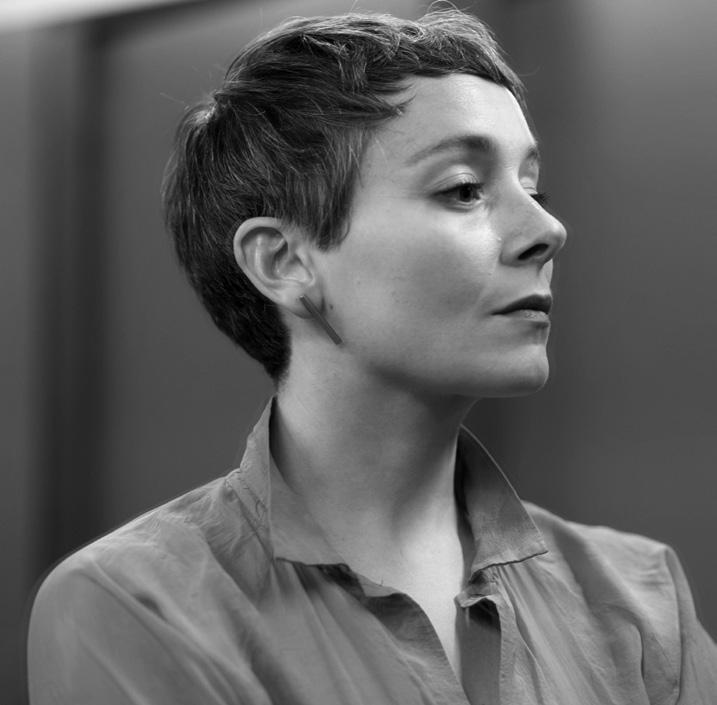
Anna Dennis studied at the Royal Academy of Music. She was the recipient of the 2023 Royal Philharmic Society’s Singer award.
Her opera performances include Katie Mitchell’s New Dark Age at the Royal Opera House, Purcell’s The Fairy Queen at Drottningholms Slottsteater in Stockholm, Handel’s Rodelinda at the Göttingen Handel Festspiel, Mozart’s Idomeneo directed by Graham Vick at Birmingham Opera Company, Damon Albarn’s Dr Dee at English National Opera, and roles in all three Monteverdi operas during John Eliot Gardiner’s world tour of the trilogy. She recently created the title role of Violet in Tom Coult’s debut opera, premiered at the Aldeburgh festival, and multiple roles in Sir David Pountney's Purcell pasticcio Masque of Might for Opera North.
In concert she has sung with the Scottish Chamber Orchestra , Orchestra of St Luke’s in New York, the Australian Chamber Orchestra, Birmingham Contemporary Music Group, Orquestra Gulbenkian, les Violons du Roy, Britten Sinfonia, and Sinfonietta Riga. She has sung Britten’s War Requiem at the Berlin Philharmonie and Thomas Ades’ Life Story, accompanied by the composer, at New York’s White Light Festival. Recent highlights have included performing Antony Burgess setting of TS Eliot’s The Wasteland with Benedict Cumberbatch and Britten Sinfonia at the Charleston Festival, Bach’s Mein Herze Schwimmt im Blut with Kristian Bezuidenhout in Riga, Haydn’s Jahreszeiten with Düsseldorfer Sinfoniker under Adam Fischer, and Handel’s Judas Maccabeuswith AKAMUS at the Berlin Philharmonie.
Her numerous recordings include Elena Langer’s Landscape with Three People, the Grammynominated Kastalsky Requiem with the Orchestra of St Luke’s under Leonard Slatkin, and Handel’s Amadigi di Gaula with Early Opera Company under Christian Curnyn.
In the coming season she will sing Queen of the Night/The Magic Flute for Opera North, Nono's Canti di Vita e d'Amore with BBC Symphony Orchestra and Handel's Orlando with the Academy of Ancient Music.
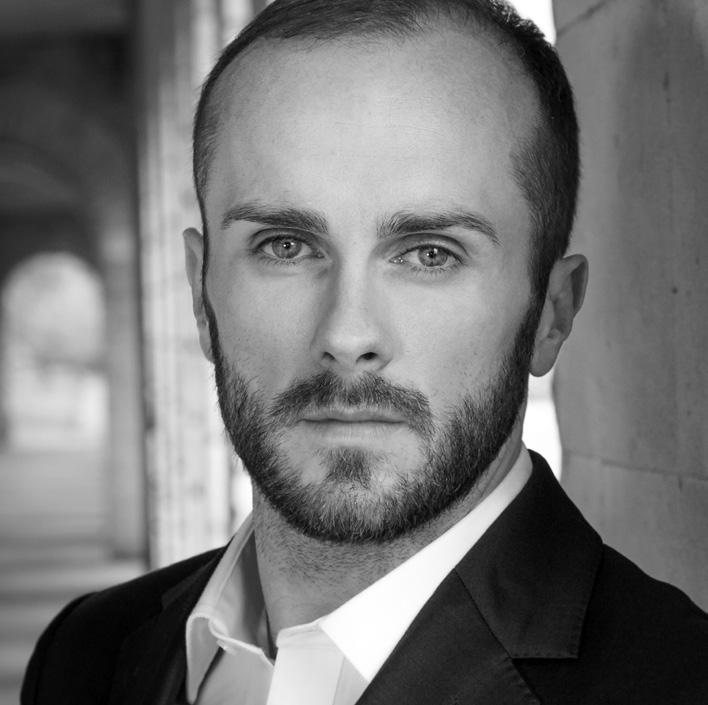
Thomas Walker studied brass at the Royal Scottish Academy of Music and Drama and singing at the Royal College of Music.
The past season and future highlights show this range of repertoire; in opera with Arnalta in L’incoronazione di Poppea at the Berlin Staatsoper Unter den Linden and Oberon in Purcell The Fairy Queen at Drottningholms Slottsteater; touring with the Orchestra of the Eighteenth Century and Daniel Reuss singing Evangelist in both Bach St John and St Matthew Passions as well as Kammerorchester Basel and René Jacobs singing Messiah; and concerts in Europe with repertoire ranging from Mozart Requiem and Rossini Petite messe solenelle to Britten Serenade for tenor, horn and strings and Beethoven Symphony No 9. Further ahead he will work again with René Jacobs in the role of Bajazet in Handel’s Tamerlano in both concerts and staged productions.
Previous highlights include L’incoronazione di Poppea with Budapest Festival Orchestra and Iván Fischer; Evangelist St Matthew Passion; Bach at Wigmore Hall with Gabrieli Consort and Paul McCreesh; the title role in Handel Belshazzar; Haydn Die Schöpfung; Orff Carmina Burana; Berlioz L’enfance du Christ and Adam in Scarlatti Il Primo Omicidio at Opéra national de Paris and Staatsoper Berlin.
Other roles include Admeto in Gluck Alceste and Rinaldo in Haydn Armida; Rameau Zoroastre at the Komische Oper Berlin; Purcell The Fairy Queen and Rameau Platée for Staatsoper Stuttgart; and Pélleas; Alessandro Il Re Pastore; Quint The Turn of the Screw; Lysander A Midsummer Night’s Dream and Lechmere Owen Wingrave for the Royal Opera House, Covent Garden; English National Opera; Scottish Opera and Innsbrucker Festwochen der Alten Musik.
His recordings include Beethoven Missa Solemnis with Cappella Amsterdam; Honegger Le Roi David with Ensemble Vocal de Lausanne; and Bach Magnificats with Arcangelo and Jonathan Cohen.

British bass-baritone Edward Grint studied at King’s College, Cambridge as a choral scholar, and at the International Benjamin Britten Opera School at The Royal College of Music. Edward was awarded 2nd prize at the 3rd International Singing Competition for Baroque Opera Pietro Antonio Cesti in Innsbruck, was a finalist in the 2014 London Handel Competition, and won the Clermont Ferrand competition in France.
On the operatic stage, Edward’s roles include Polyphemus Acis and Galatea (Opera Avignon), Arcas Iphigenie en Aulide (Theater an der Wien), Adonis Venus and Adonis, Aeneas Dido and Aeneas (Innsbruck Festival), Father Akita in Neige by Catherine Kontz (Grand Theatre Luxembourg) and Teobaldo Faramondo by Handel (Göttingen Handel Festival). At the Royal College of Music, Edward performed Count Almaviva Le Nozze di Figaro, Isacio Riccardo Primo (London Handel Festival), Splendiano Djamileh, Mr Delancey Aqualung (World Premiere), Garibaldo Rodelinda and Tirenio Il Pastor Fido (LHF), John Styx Orpheus in the Underworld, 2nd Priest/Armed man Die Zauberflöte, Micha The Bartered Bride. Other roles performed include Colonel Patience (Musée D’Orsay, Paris), Hobson Peter Grimes, Mother Die Sieben Tödsunden (Cuenca Festival), Thoas Iphigenie en Tauride (Euphonia), Zaretsky Eugene Onegin (Ryedale Festival), Guglielmo Cosi fan tutte for the Rye Festival, Achilla Giulio Cesare in Amsterdam under Michael Chance, and Polyphemus Acis and Galatea with Laurence Cummings in London.
In concert Edward has performed with many of the UK’s leading ensembles. Highlights include Bach and Kuhnau Cantatas with The King’s Consort (Wigmore Hall), Bach St. Matthew Passion (London Handel Festival and The King’s Consort), St. John Passion (Les Musiciens du Louvre, St. Paul’s Cathedral with the London Mozart Players), Magnificat with the Orchestra of the Age of the Enlightenment (Valletta Baroque Festival, Malta), Bach Coffee Cantata with Laurence Cummings and the Adderbury Ensemble (Holywell Music Rooms, Oxford), Haydn’s Creation, Handel Israel in Egypt (King’s College Cambridge), Messiah (City of London Sinfonia, and Birmingham with Ex Cathedra), Handel Dixit Dominus in Cambridge, Brahms Requiem (Cadogan Hall), Verdi Requiem (West Road Concert Hall, Cambridge), Britten War Requiem (Huddersfield Town Hall), Elgar Dream of Gerontius (Ely Cathedral and Cadogan Hall), and Vaughan Williams Sea Symphony (National Festival Orchestra).
Chorus Director
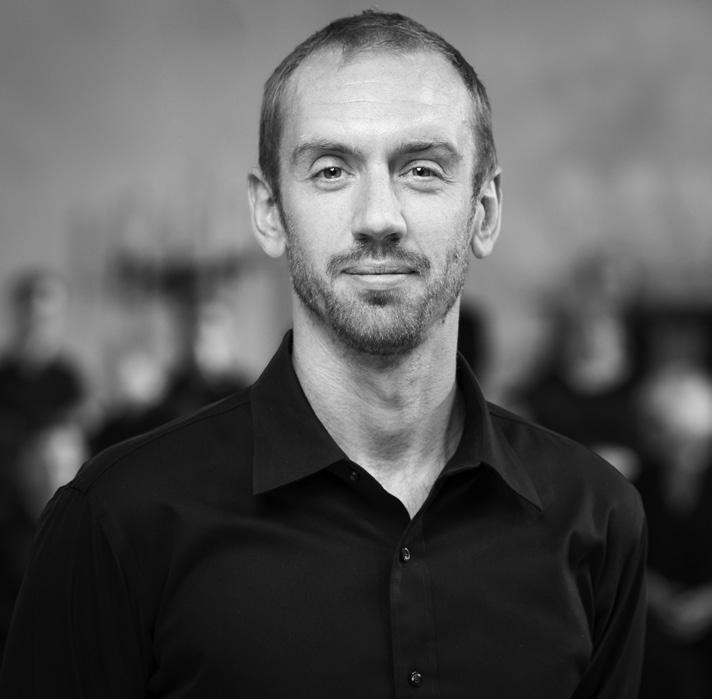
Gregory Batsleer is acknowledged as one of the leading choral conductors of his generation, winning widespread recognition for his creativity and vision. Since taking on the role of SCO Chorus Director in 2009 he has led the development of the Chorus, overseeing vocal coaching, the SCO Young Singers’ Programme and the emergence of regular a capella concerts. As well as preparing the Chorus for regular performances with the Orchestra, he has directed successful appearances at the Edinburgh International Jazz, East Neuk, Glasgow Cathedral and St Andrews Voices Festivals, at Greyfriars Kirk and on the SCO’s Summer Tour.
In 2021 Gregory took up the position of Festival Director for the London Handel Festival. He leads programming and development of the Festival, fulfilling its mission to bring Handel’s music to the widest possible audiences. Since 2017 he has been Artistic Director of Huddersfield Choral Society and was Chorus Director with the Royal Scottish National Orchestra from 2015 - 2021.
As guest conductor, Gregory has worked with many of the UK’s leading orchestras and ensembles. Recent highlights include performances with the Royal Northern Sinfonia, RSNO, Hallé Orchestra, Black Dyke Band, National Youth Choir of Great Britain, Orchestra of Opera North, Manchester Camerata, SCO and Royal Liverpool Philharmonic.
From 2012 to 2017, he was Artistic Director of the National Portrait Gallery’s Choir in Residence programme, the first ever in-house music programme of any gallery or museum in the world. He has curated and devised performances for the Southbank Centre, Wilderness Festival and Latitude and collaborated with leading cultural figures across a variety of different art forms. Gregory is the cofounder and conductor of Festival Voices, a versatile ensemble dedicated to cross-art collaboration.
As a non-executive director, Gregory sits on the board of Manchester Camerata. His outstanding work as a choral director was recognised with the 2015 Arts Foundation’s first-ever Fellowship in Choral Conducting.
Gregory’s Chair is kindly supported by Anne McFarlane

The Scottish Chamber Orchestra Chorus, under the direction of Gregory Batsleer since 2009, has built a reputation as one of Scotland’s most vibrant and versatile choirs. Widely regarded as one of the finest orchestral choruses in the UK, it celebrated its 30th anniversary in 2021.
Members enjoy the unique opportunity of performing with one of the world’s leading chamber orchestras, working with international conductors including Maxim Emelyanychev, Andrew Manze, Harry Christophers, Richard Egarr, Vaclav Luks and Sir James MacMillan.
The Chorus appears regularly with the Orchestra in Scotland’s major cities. Recent concerts have covered a wide range of music including Bach Mass in B minor, Brahms Requiem, Stravinsky Mass, Haydn Creation, a rare performance of Vaughan Williams Flos Campi and the premiere of The Years by Anna Clyne, SCO Associate Composer 2019-2022. The world premiere of Sir James MacMillan’s Composed in August was a highlight of the 2023-24 Season.
The SCO Chorus also performs a capella, both digital and live, in music ranging from Thomas Tallis to new work by Anna Clyne and Jay Capperauld. Its annual Christmas concerts have established themselves as a Season highlight; the Chorus also enjoys appearing on the SCO’s Summer Tour.
Other notable out-of-Season appearances have included critically-acclaimed performances with the SCO at the BBC Proms in Handel’s Jephtha in 2019 and in Mendelssohn's Elijah in 2023. The Chorus appeared in a semi-staged performance of Mozart’s Die Zauberflöte at the 2023 Edinburgh International Festival, resulting in an immediate re-invitation for Così fan tutte in 2024.
Our Young Singers' Programme was established in 2015 to nurture and develop aspiring young singers. It is designed for young people with a high level of choral experience and ambitions to further their singing with a world-class ensemble.
Further information at sco.org.uk
The SCO Chorus Young Singers' Programme is kindly supported by the Baird Educational Trust and the D’Oyly Carte Charitable Trust.
Gregory Batsleer
Chorus Director
Stuart Hope
Associate Chorusmaster
Emma Morwood
Voice Coach
Susan White
Chorus Manager
* Young Singers' Programme
Kirstin Anderson
Nancy Burns
Morven Chisholm
Joanne Dunwell
Liberty Emeny
Lucy Forde
Emily Gifford
Holly Gowen
Nicola Henderson
Emily Kemp*
Elizabeth McColl
Katie McGlew
Jenny Nex
Ciara O'Neill*
Alison Williams
ALTO
Shona Banks
Dinah Bourne
Sarah Campbell
Gill Cloke
Judith Colman
Anne Gallacher
Jennie Gardner
Claire Goodenough
Caroline Hahn
Melissa Humphreys
Elaine McAdam
Hilde McKenna
Charlotte Perkins
Linda Ruxton
Matthew Andrews
Ben Evans*
Colin French
Ian Gibson
Peter Hanman
Keith Main
Matt Norriss
Michael Scanlon
Paul Vaughan
BASS
Conrad Boyle*
Mathew Brown
Gavin Easton
Luke Francis*
Hugh HillyardParker
Richard Hyder
Richard Murphy
Kenneth Murray
Douglas Nicholson
Jason Orringe
David Paterson
Jonathan Pryce
Fraser Riddell
Peter Silver
Stephen Todd
Roderic Wylie
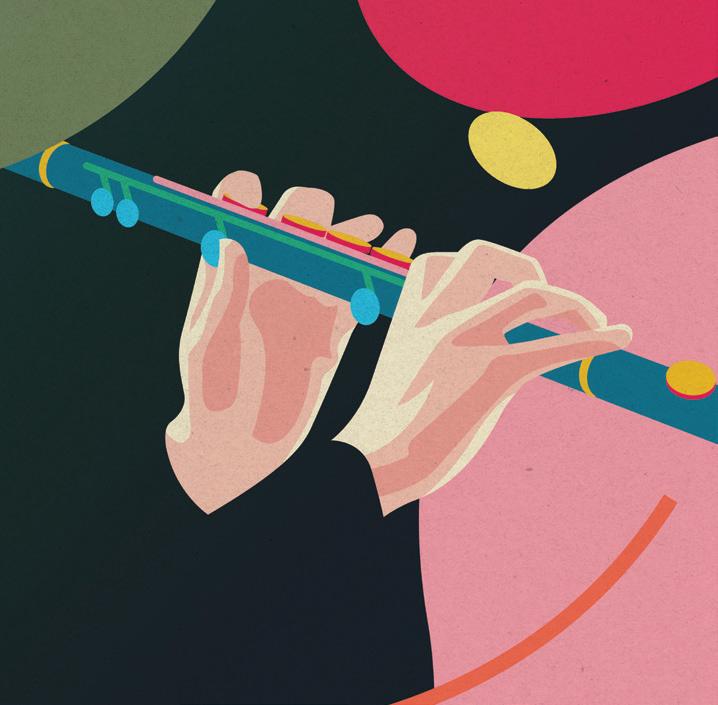
The Scottish Chamber Orchestra (SCO) is one of Scotland’s five National Performing Companies and has been a galvanizing force in Scotland’s music scene since its inception in 1974. The SCO believes that access to world-class music is not a luxury but something that everyone should have the opportunity to participate in, helping individuals and communities everywhere to thrive. Funded by the Scottish Government, City of Edinburgh Council and a community of philanthropic supporters, the SCO has an international reputation for exceptional, idiomatic performances: from mainstream classical music to newly commissioned works, each year its wide-ranging programme of work is presented across the length and breadth of Scotland, overseas and increasingly online.
Equally at home on and off the concert stage, each one of the SCO’s highly talented and creative musicians and staff is passionate about transforming and enhancing lives through the power of music. The SCO’s Creative Learning programme engages people of all ages and backgrounds with a diverse range of projects, concerts, participatory workshops and resources. The SCO’s current five-year Residency in Edinburgh’s Craigmillar builds on the area’s extraordinary history of Community Arts, connecting the local community with a national cultural resource.
An exciting new chapter for the SCO began in September 2019 with the arrival of dynamic young conductor Maxim Emelyanychev as the Orchestra’s Principal Conductor. His tenure has recently been extended until 2028. The SCO and Emelyanychev released their first album together (Linn Records) in November 2019 to widespread critical acclaim. Their second recording together, of Mendelssohn symphonies, was released in November 2023.
The SCO also has long-standing associations with many eminent guest conductors and directors including Principal Guest Conductor Andrew Manze, Pekka Kuusisto, François Leleux, Nicola Benedetti, Isabelle van Keulen, Anthony Marwood, Richard Egarr, Mark Wigglesworth, Lorenza Borrani and Conductor Emeritus Joseph Swensen.
The Orchestra’s current Associate Composer is Jay Capperauld. The SCO enjoys close relationships with numerous leading composers and has commissioned around 200 new works, including pieces by Sir James MacMillan, Anna Clyne, Sally Beamish, Martin Suckling, Einojuhani Rautavaara, Karin Rehnqvist, Mark-Anthony Turnage, Nico Muhly and the late Peter Maxwell Davies.
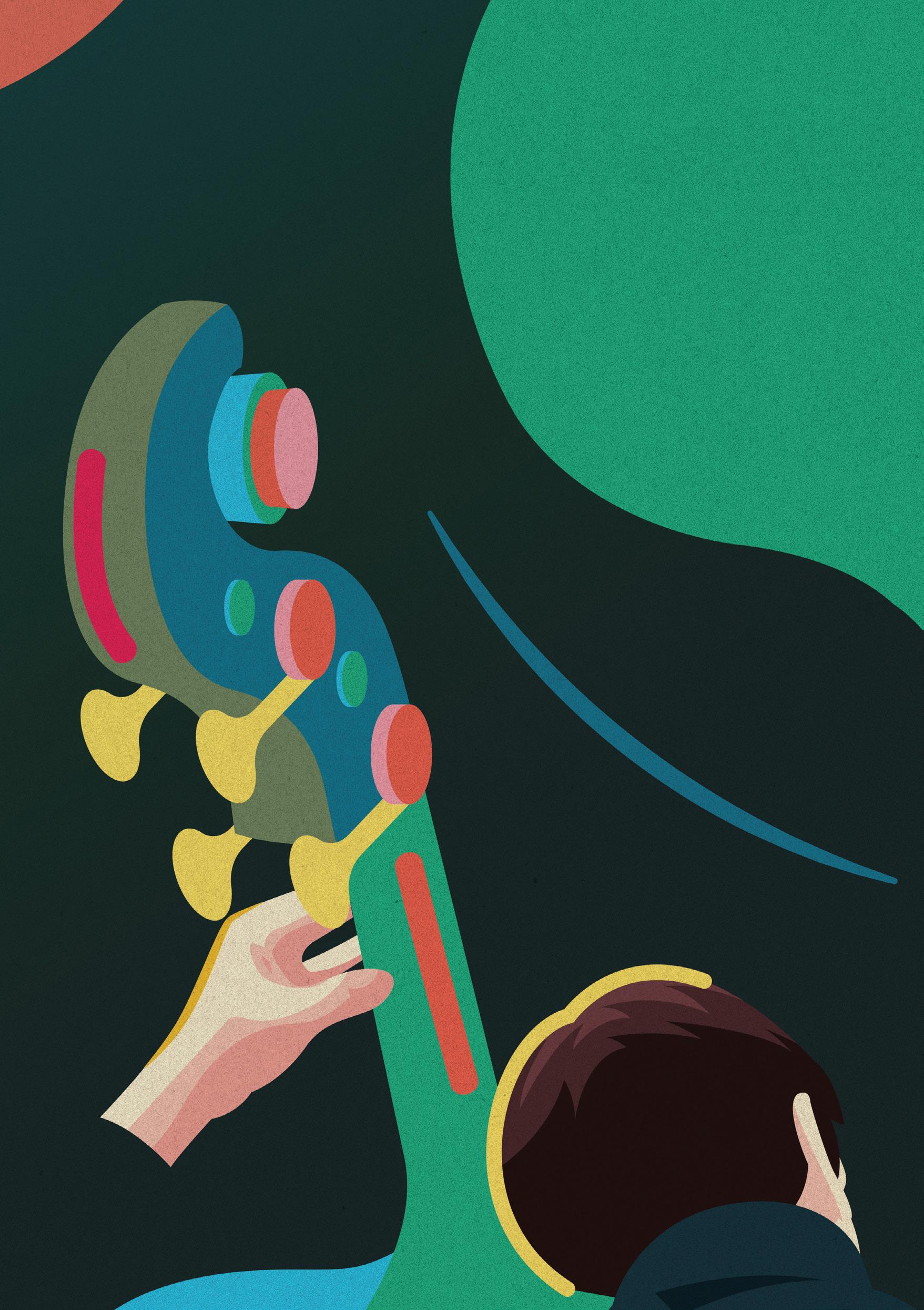







At the SCO, we deeply value our incredible community of regular donors.
Each year, we must raise £1.2 million to continue delivering outstanding musical performances on-stage and innovative education and community work off-stage. Every donation has a positive impact on our work, and, in return, we bring our donors closer to the Orchestra and our wonderful array of visiting artists.
For more information on how you can become a regular donor, please get in touch with Hannah on 0131 478 8364 or hannah.wilkinson@sco.org.uk
sco.org.uk/support-us